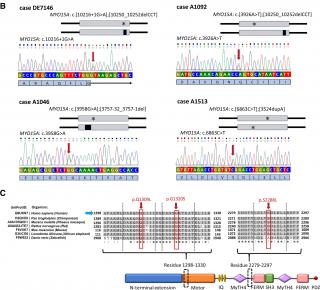Jul, 2022

Recessive variants in the MYO15A gene constitute an important cause of sensorineural hearing impairment (SNHI). However, the clinical features of MYO15A-related SNHI have not been systemically investigated. This study aimed to delineate the hearing features and outcomes in patients with pathogenic MYO15A variants. This study recruited 40 patients with biallelic MYO15A variants from 31 unrelated families. The patients were grouped based on the presence of N-terminal domain variants (N variants). The longitudinal audiological data and for those undergoing cochlear implantation, the auditory and speech performance with cochlear implants, were ascertained and compared between patients with different genotypes. At the first audiometric examination, 32 patients (80.0%) presented with severe to profound SNHI. Patients with at least one allele of the N variant exhibited significantly better hearing levels than those with biallelic non-N variants (78.2 ± 23.9 dBHL and 94.7 ± 22.8 dBHL, respectively) (p = 0.033). Progressive SNHI was observed in 82.4% of patients with non-profound SNHI, in whom the average progression rate of hearing loss was 6.3 ± 4.8 dBHL/year irrespective of the genotypes. Most of the 25 patients who underwent cochlear implantation exhibited favorable auditory and speech performances post-implantation. The hearing features of patients with biallelic pathogenic MYO15A variants are characterized by severe to profound SNHI, rapid hearing progression, and favorable outcomes with cochlear implants. Periodic auditory monitoring is warranted for these patients to enable early intervention.